Australia has every reason to seek good relations and friendship with India, writes Peter Job. But that does not require an unqualified endorsement and deification of Prime Minister Modi and his agenda.
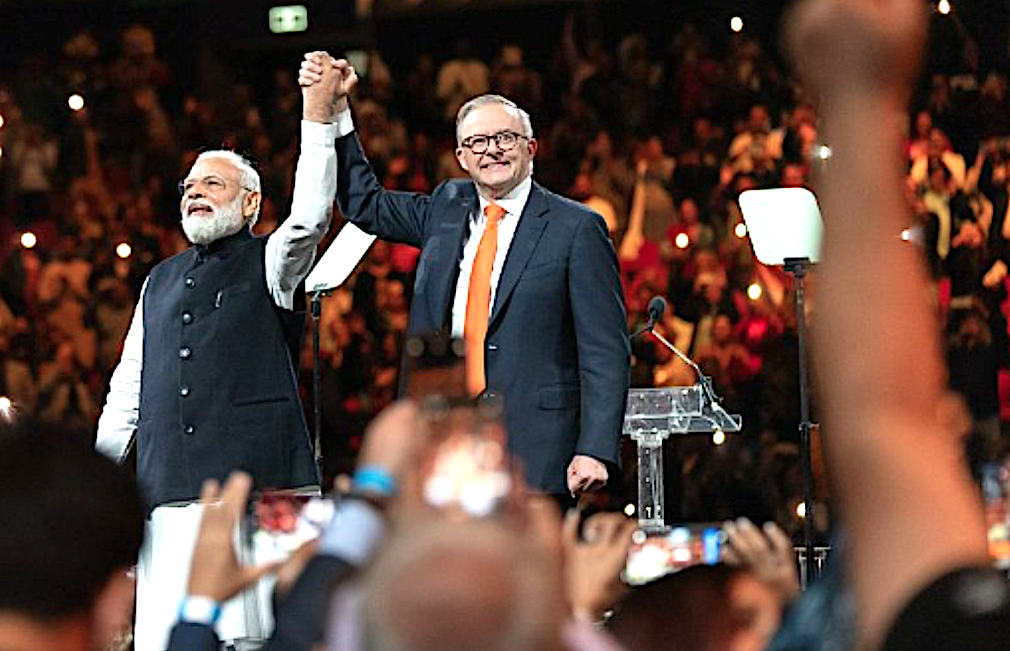
Indian Prime Minister Narendra Modi and Australian Prime Minister Anthony Albanese in Sydney on May 23. (Twitter/@AlboMP)
By Peter Job
Declassified Australia
 Australian Prime Minister Albanese joins a long tradition of leaders seeking to use rock star gloss to obscure human rights abuses behind a roar of patriotism. Donald Trump, Barack Obama and Ronald Reagan all misused Bruce Springsteen as a patriotic rallying point.
Australian Prime Minister Albanese joins a long tradition of leaders seeking to use rock star gloss to obscure human rights abuses behind a roar of patriotism. Donald Trump, Barack Obama and Ronald Reagan all misused Bruce Springsteen as a patriotic rallying point.
Greeting Indian Prime Minister Modi as “The Boss” in a packed stadium where Bruce Springsteen performed, gave a rock star sheen subsequently reflected in considerable sections of the Australian media, business and academic communities. Australia’s endorsement of Modi was quickly incorporated into his Bharatiya Janata Party’s campaigning, with the “Boss” phrase clearly taken at face value by many.
[Modi visited the White House last week and was similarly feted.]
Human rights practices in India under Modi have been condemned by the U.S. Department of State as recently as 2022. “Significant human rights issues” have been repeatedly cited. These include extrajudicial killings by the government or its agents, arbitrary arrest and detention, political prisoners and detainees, torture and degrading treatment, interference with the freedom of peaceful assembly and freedom of association. Restrictions on freedom of expression and media have included violence or threats of violence, unjustified arrests or prosecutions of journalists.
In December 2019 Modi’s government introduced the Citizenship Amendment Act, which makes religion a basis for a pathway to citizenship to the detriment of Muslims. According to Human Rights Watch, authorities have adopted laws that discriminate against Muslims and other religious minorities, with police and the courts, under the influence of Modi’s BJP, empowering nationalist groups to threaten, harass, and attack religious minorities with impunity.
In April this year, opposition leader Rahul Gandhi was sentenced to two years in prison after he criticised Modi for his association with an alleged corrupt billionaire. Modi’s ruling party used its majority to quickly expel Gandhi from Parliament in the wake of the ruling. Leaders of other parties and government critics have also faced arrests and prosecution.
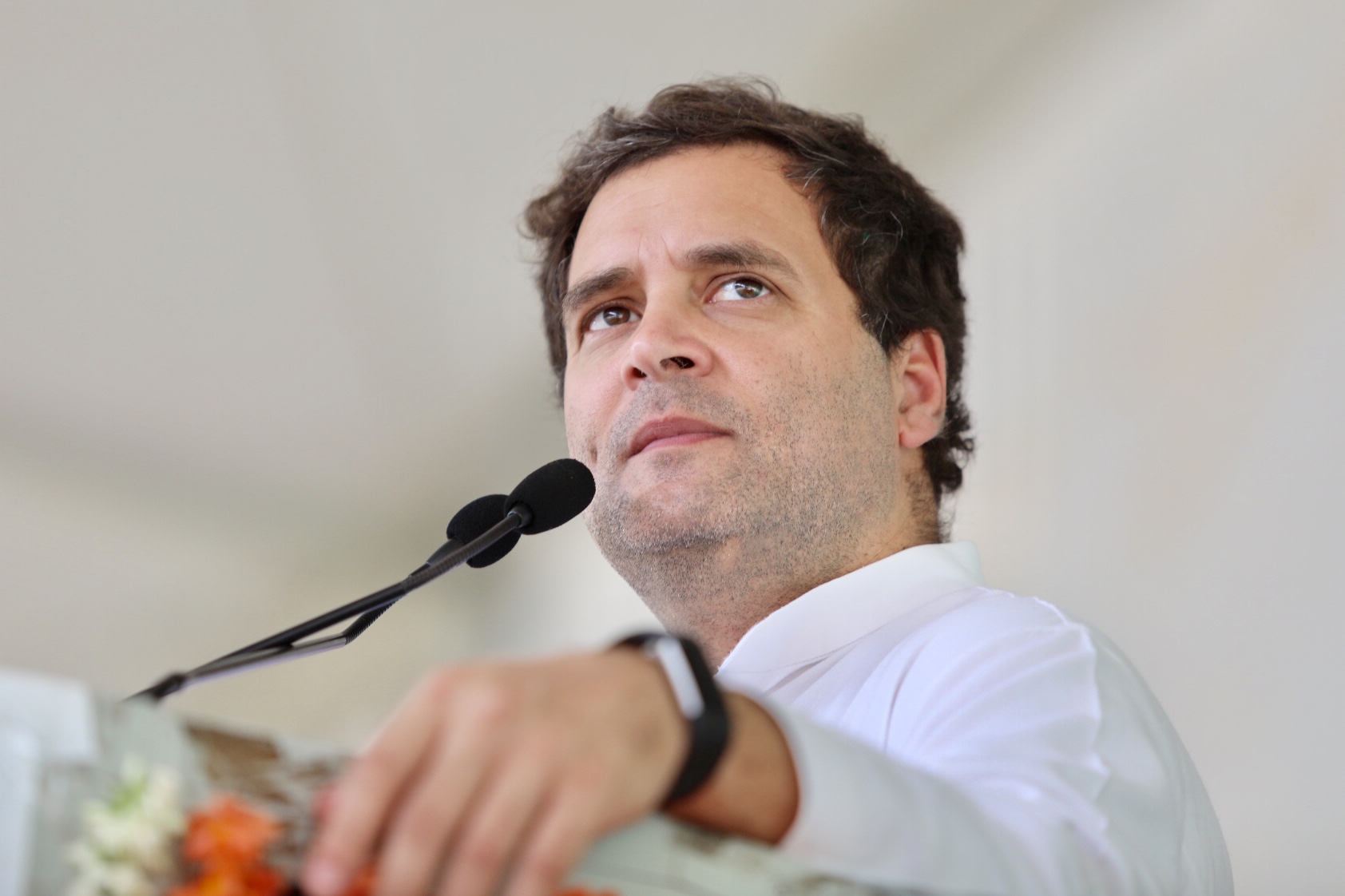
Rahul Gandhi addressing a 2018 rally in Karnataka, India. (Sidheeq, CC BY-SA 4.0, Wikimedia Commons)
In 2019, Modi’s Hindu nationalist Bharatiya Janata Party (BJP) government revoked the semi-autonomous status of the northern border state of Jammu and Kashmir, the contested Indian-controlled portion of the Kashmir region. Since then, Human Rights Watch has cited increasing human rights concerns in the largely Muslim territory.
These actions include extrajudicial killings, the arbitrary detention of hundreds of people, frequent communication blackouts to suppress dissent, severe restrictions on freedom of movement and assembly, suppression of civil rights groups by the use of counterterrorism and public safety laws and raids, and police interrogation, assault, restrictions on movement and fabricated criminal cases against journalists.
Complicit in Gujarat Anti-Muslim Riots
Modi has been widely accused of complicity in the violent 2002 Gujarat anti-Muslim riots by Hindu extremists that cost the lives of up to 2,000 people, mostly Muslim Indians, when he was chief minister of Gujurat state. At the time, both the U.K. and the U.S. placed a diplomatic boycott on Modi in response to the killings.
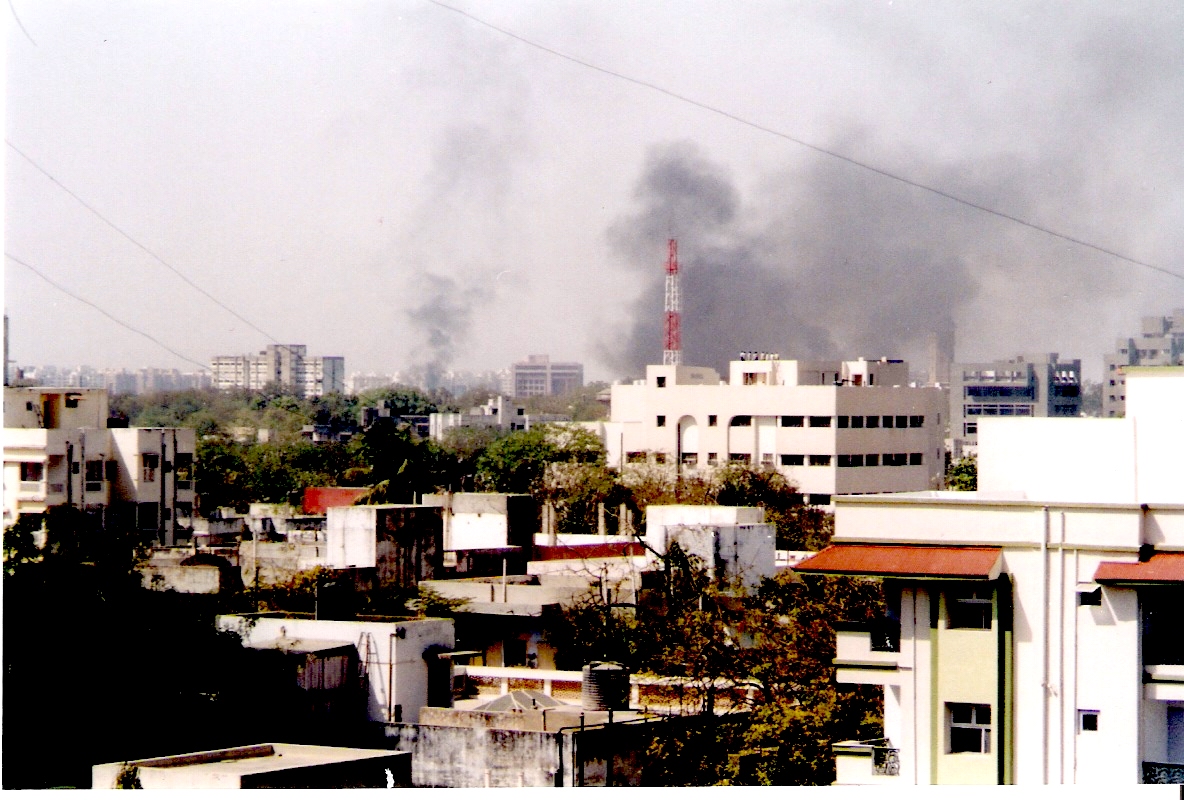
Skyline of Ahmedabad in Gujarat, India, filled with smoke as buildings and shops were set on fire by rioting mobs in 2002. (Aksi great, Wikimedia Commons, CC BY 2.5)
A newly leaked confidential U.K. diplomatic cable from the British embassy back to London, reported on the violence stating the “systematic campaign of violence” had ‘all the hallmarks of ethnic cleansing.”
“The aim of the perpetrators of the violence, the [extremist Hindu nationalist group] VHP and other Hindu extremist groups, was to purge Muslims from Hindu and mixed localities in order to ghettoise them. Their systematic campaign of violence has all the hallmarks of ethnic cleansing.”
The U.K. government document alleges Narendra Modi had direct responsibility for the Gujarat abuses:
“Chief Minister Narendra Modi is directly responsible. His actions have not just been guided by a cynical assessment of political advantage. As an architect of the BJP’s Hindu nationalist agenda, which it has pursued in Gujarat since it came to power in 1995, he is a believer in the VHP’s ideological motivation.”
Extracts of the document were first revealed in January by a BBC documentary “India: The Modi Question,” examining Modi’s role in the Gujurat violence. Declassified Australia publishes the document here in full.
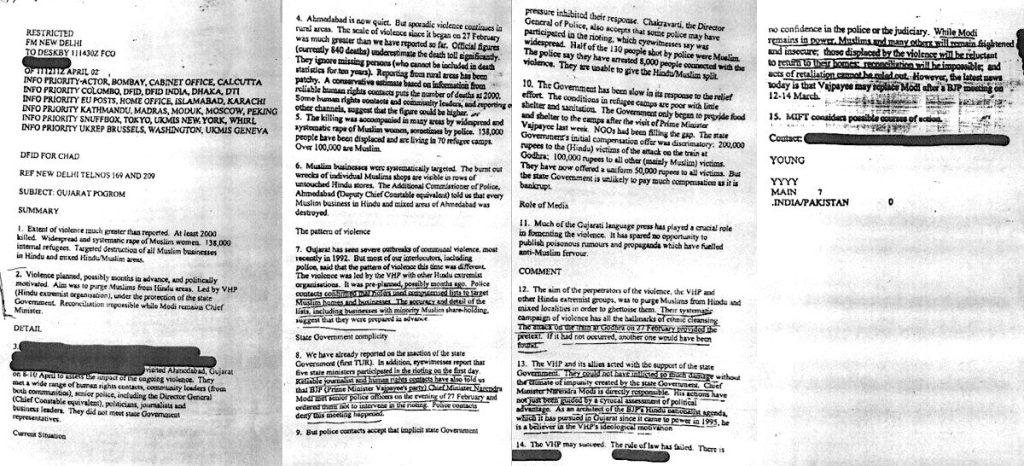
A copy of the leaked classified U.K. diplomatic cable reporting on the Gujurat riots of 2002 in which now-Indian Prime Minister Narendra Modi has been implicated. (TheWire.in )
In response to the documentary, emergency laws in India were invoked. The government banned the screening of the documentary in India and stopped Youtube and Twitter from sharing links and clips of the documentary online.
The documentary was shown in Australia last month at a Parliament House screening in Canberra, organised by members of the Indian diaspora and the Australian Greens. A free-to-air screening in Australia is awaited, though it can be viewed here on Youtube.
Following the banning of the documentary, BBC offices in India were raided by Indian tax department officials. Most concerningly for contacts and dissidents, the offices were sealed and the phones and documents of journalists were confiscated.
A strong relationship with Modi’s government in particular suits, of course, the Australian bipartisan commitment to institutions such as the Quad regional pact which support the U.S. empire’s and Australia’s sub-imperial agenda of containing China and supporting an international order that favours Western interests.
Containing China & Projecting Western Interests
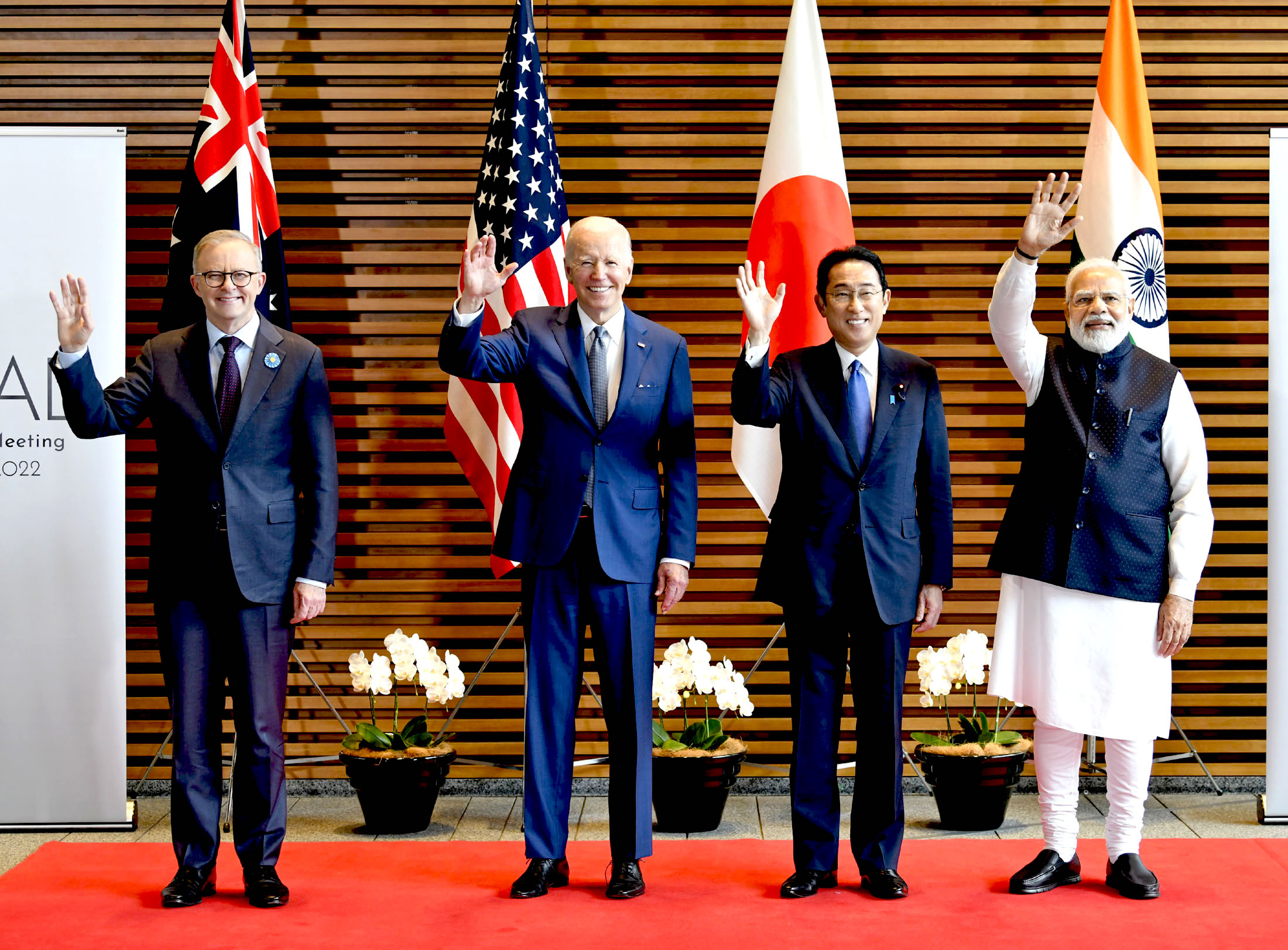
From Left: Australian Prime Minister Anthony Albanese, U.S. President Joe Biden, Japanese Prime Minister Fumio Kishida and Indian Prime Minister Modi Narendra during QUAD meeting in Tokyo in May 2022. (Wikimedia Commons, CC BY 4.0)
First established in 2007 and initially lasting only two years, the Quad was revived in 2017, although it did not hold its first leaders’ meeting until 2021.
The members — India, Japan, Australia and the United States — state their aim “to enhance our cooperation and raise our mutual ambitions as we address accelerating climate change.”
While the Quad is described by its members as supporting “a free and open Indo-Pacific…anchored by democratic values” and a “rules-based order, rooted in international law to advance security and prosperity,” there is little doubt that its principal reason for being is containing China, and projecting western interests in the region.
Although traditionally non-aligned, with strong differences with China itself and seeing economic opportunities in Western nations, India under Modi has seen it in its interests to support such an agenda and establish strategic partnerships with key pro-Western nations. This is particularly when such partnerships and subsequent interactions with foreign leaders also enhance his domestic standing.
Going soft on India’s human rights abuses and Modi’s repressive government potentially emboldens the Modi government in further violations in the knowledge that it will not be held to account by the countries that talk the most about an “international rules-based order.”
Modi is vulnerable to criticism by such countries, intent as his government is on emerging as a world power in partnership with Western nations arrayed against China.
Modi’s enthusiasm for a strategic partnership with Australia is considered more important to Australian interests than his domestic agenda, as destructive as it may be to Indian democracy and the human rights of its citizens.
The contrast between the many clearly stated Australian criticisms of China’s actions, and its willingness to overlook the Indian government’s abuses, is obvious if not surprising.
Human rights have never played a central role in Australian foreign policy, at least not when they clash with other goals. Australia has been amongst the foremost supporters of a number of repressive dictatorships when the foreign affairs establishment perceives such a position to be in accordance with its understanding of the Australian national interest.
The Australian selective disinterest in human rights in the long term often proves counter-productive. During the Suharto dictatorship in Indonesia, Australia acted as the key apologist on the world stage for the regime’s actions against its own citizens, and the people of East Timor and West Papua.
Dissident Indonesians later recounted how they waited in vain for expressions of support from democratic nations such as Australia which proclaimed their democratic credentials and support for human rights on the world stage.
When a succession of Australian prime ministers praised Suharto and obscured his regime’s abuses, the position of democracy and human rights campaigners in Indonesia became more difficult and dangerous, abuses against them by the regime more forthcoming, and the regime itself more impervious to reform as well as more prolonged.
Friendship with a Prominent Power
Relations between India and Australia are appropriately, to an extent, defined by the history of British colonialism that robbed the resources of the Indian subcontinent and impoverished the majority of its citizens, a process of which Australia, as a settler colonial nation to which some of the wealth flowed, was a beneficiary.
India is now the most populous nation in the world, one that has been regarded on the world stage as a democracy and that is still emerging from the exploitative legacy of British colonialism onto the world stage as a major power.
The Indian people have every reason to expect a prominent position in the international community. Australia has every reason to seek good relations and friendship with the Indian people in the interests of both nations and the world.
Governments and leaders change, and that India presently suffers from leadership that is damaging Indian democracy and abusing the rights of many Indian citizens should not curtail Australia’s support for friendship with the Indian people.
Indians however are divided about Modi, and while he clearly has supporters, friendship with the Indian people is not the same as unqualified endorsement and deification of the present Indian prime minister and his agenda.
Australia has implicitly endorsed Modi’s domestic agenda, including his attacks on democracy and on dissent. There is nothing in the interests of the Australian people that will be enhanced by this extreme position of deference to Modi and indifference to human rights concerns.
Peter Job helped run a clandestine radio network in northern Australia in 1978 receiving messages from Fretilin inside East Timor, including about the forced famine. Peter has now completed a PhD in International and Political Studies from the University of New South Wales in Canberra. His book, A Narrative of Denial: Australia and the Indonesian Violation of East Timor, was published by Melbourne University Publishing in 2021. He is on Twitter @JobPeterjob1.
This article is from Declassified Australia.
The views expressed are solely those of the author and may or may not reflect those of Consortium News.
Support CN’s Spring
Fund Drive Today



Manipur in the north-east of India has been burning for the last 2 months with no action taken by the BJP controlled government. The PM has not spoken a word about it to condemn which also gives the impression that the government is complicit. Thousands of Christian tribes including children getting killed.
Ironically, India under Modi seems to stick to non-alignment, and feting Modi is futile attempt to sway him into a pro-Western position. Non-alignment is beneficial for India, including business, importing from Russia and China and exporting elsewhere, and ignoring, now more than before, Western sanctions. Combination of nationalism, politicized religion and human rights deficiencies with non-alignment characterize both Erdogan and Turkey.
My thinking is that including human rights in foreign policy agenda is a failure, especially in the context of renewed Cold War. In this context, hypocrisy and thus loosing the potentially valuable message is inevitable. Overlooking regress on human rights when convenient was always the norm, with the novelty of “importing methods” from countries like India under Modi for domestic use in the West.
It’s all fake. It’s all futile. “No- one Here Gets out Alive” by Jerry Hopkins/Danny Sugerman.
The photo of the “smiling faces” looks as fake as the plantpots behind them. Waxworks.
What do these people know about the suffering of their citizens?